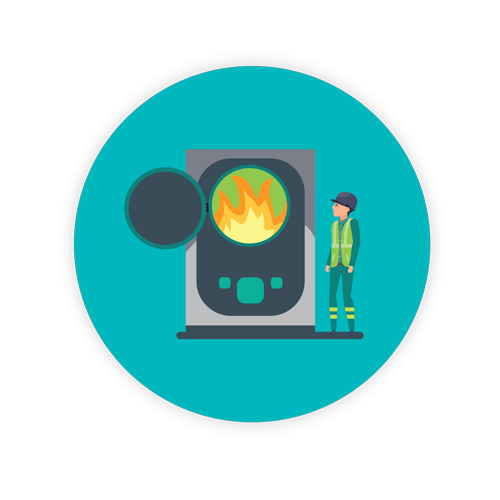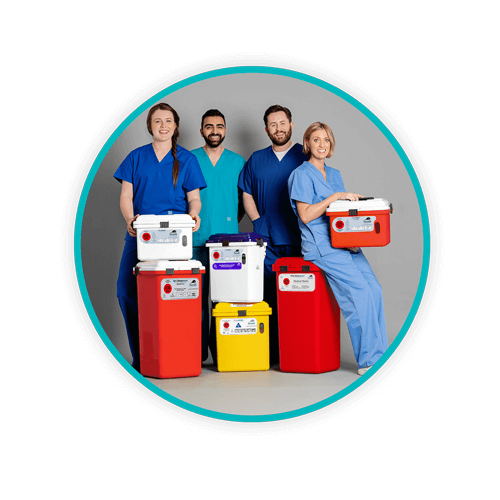What Is a Medical Waste Incinerator and How Does it Work?

Medical waste incineration is a critical process in managing healthcare waste. It utilizes high temperatures to safely eliminate harmful materials. This method is essential for hospitals and healthcare facilities to manage waste responsibly and efficiently.
TOPICS WE WILL COVER:
1 / Understanding Medical Waste Incineration
4 / What Wastes Require Incineration?
5 / Key Considerations for Effective Incineration
6 / Daniels Health: Enhancing Waste Segregation for Better Environmental Outcomes
7 / Ready to Handle Medical Waste the Smart Way? Call Daniels Health
Understanding Medical Waste Incinerators
Medical waste incineration is the combustion of wastes produced by healthcare facilities. This process is essential for eliminating hazardous and infectious materials that cannot be safely disposed of by other means.
According to The Journal of ExtraCorporeal Technology, in the United States, between 49-60% of medical waste undergoes incineration, 20-37% is processed through autoclaving, and 4-5% percent is managed using alternative technologies.
How Do Incinerators Work?
How incinerators work: through the combustion of waste at high temperatures to reduce its volume and neutralize hazardous components. Learning how to use an incinerator for hospital waste is a multi-step process, beginning with the segregation and loading of waste into the combustion chamber.
Once loaded, the incinerator is ignited, and the temperature is carefully monitored and adjusted to ensure complete combustion of the waste. After the incineration process is complete, the remaining ash is safely disposed of, significantly reducing the risk of contamination.
How Hot Does an Incinerator Get?
The temperature within an incinerator is a critical factor, with most medical waste incinerators operating between 1,800°F to 2,200°F. This range is sufficient to break down complex chemical bonds in the waste, resulting in the conversion of solid or liquid waste into gas and ash.
Types of Incineration
Incinerators are not typically located within hospitals but are found in specialized waste incineration facilities. The primary types of incinerators include:
Controlled Air
Controlled air incinerators are the most widely used type for medical waste. They operate on the principle of regulating the air supply during combustion to maintain optimal burning conditions.
By carefully controlling the amount of air introduced into the combustion chamber, these incinerators can achieve more complete combustion of waste, significantly reducing the quantities of waste and destroying hazardous pathogens effectively.
Excess Air
Excess air incinerators use a surplus of air to ensure complete combustion. The abundance of oxygen helps to fully oxidize the waste, reducing the risk of producing harmful by-products from incomplete burning.
These systems are particularly useful for treating waste with high moisture content or low calorific value, as the extra air supports more consistent and complete combustion.
Rotary Kiln
Rotary kiln incinerators represent a more advanced solution for medical incinerators, capable of handling large volumes of waste, including irregularly shaped, bulky, or liquid waste.
The rotary motion of the kiln ensures that waste is continually turned, exposing all sides to the high temperatures within the combustion chamber. This movement promotes more uniform burning and complete destruction of waste materials.
What Wastes Require Incineration?
Incinerators are required to be used on certain medical wastes that can’t safely be autoclaved and disposed of in landfills. Medical waste refers to solid waste or liquid waste contaminated with blood, human body fluids, or other materials that could potentially spread infection. It is not to be confused with hazardous waste, which is any waste with properties that make it potentially dangerous or harmful to human health or the environment.
Incineration ensures that potentially harmful pathogens and substances are destroyed before proper disposal.
Key Considerations for Effective Incineration
Using incinerators for hospital waste requires careful management to ensure safe and efficient operations. Here are some key considerations:
Operational Costs
The costs of running a medical incinerator can be significant. Operating a medical incinerator involves costs such as initial investment, fuel, labor, maintenance, and compliance with environmental regulations. Managing these expenses effectively ensures that incineration remains a cost-efficient method for disposing of medical waste.
Compliance with Regulations
Medical incinerators must adhere to various local, state, and federal guidelines designed to protect public health and the environment. These regulations cover air emissions standards, waste handling protocols, and operational procedures. Healthcare facilities need to stay informed and compliant with these regulations to ensure safe and effective incineration practices.
Limited Number of Incinerators
With a finite number of incinerators available, efficient scheduling and waste segregation are invaluable for avoiding backlogs in waste processing. Properly segregating waste at the source can help manage the volume of waste needing incineration and ensure timely disposal.
Daniels Health: Enhancing Waste Segregation for Better Environmental Outcomes

Daniels Health actively collaborates with healthcare facilities to enhance waste segregation practices, ensuring that the only waste directed towards incineration is that requiring such disposal.
By working closely with healthcare providers, Daniels Health helps implement efficient segregation protocols that identify and separate different types of waste.
This strategic approach not only supports the healthcare sector’s safety and sustainability objectives but also aids in significant waste volume reduction. By ensuring that only necessary waste is incinerated, Daniels Health helps reduce the environmental impact associated with waste disposal.
Ready to Handle Medical Waste the Smart Way? Call Daniels Health
Beyond medical waste incineration, Daniels Health can help you achieve safe, compliant, and environmentally responsible health care waste management.
Contact us to learn more about how we can help your facility improve waste segregation and disposal practices.
Let's Talk!
Your time is valuable, and we don’t want to play hard to get. You can either phone us directly on the details listed on our contact page, or feel free to fill out this short form and one of our team members will get back to you as quickly as possible.
